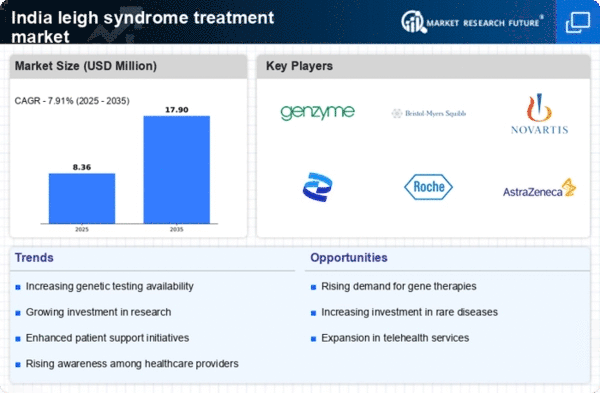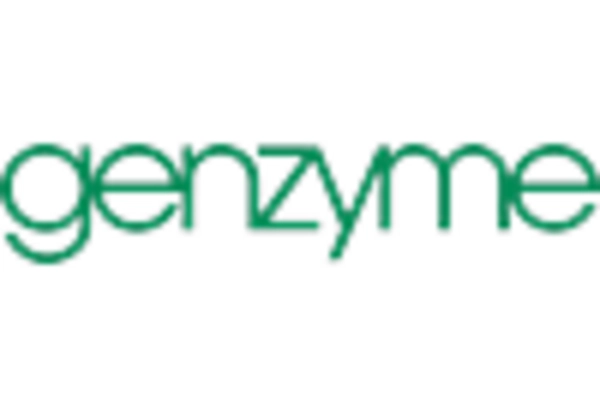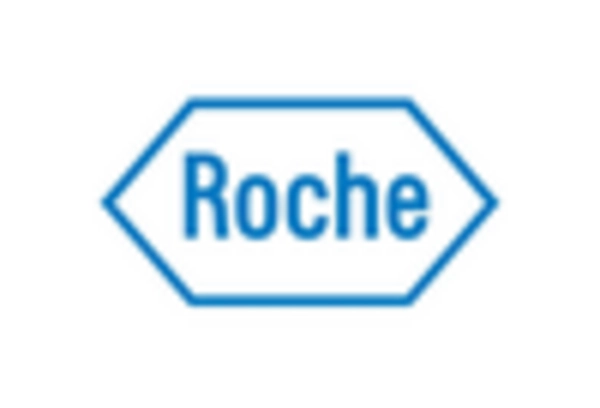Advancements in Genetic Testing
Advancements in genetic testing technologies are significantly influencing the leigh syndrome treatment market. The ability to accurately diagnose Leigh syndrome through genetic testing has improved, allowing for earlier identification of affected individuals. This is particularly relevant in India, where genetic disorders are prevalent due to various factors, including consanguinity. Enhanced testing methods, such as next-generation sequencing, are becoming more accessible and affordable, which may lead to increased screening and diagnosis rates. As a result, healthcare providers are likely to recommend targeted therapies based on genetic profiles, thereby expanding the treatment options available in the leigh syndrome-treatment market. This shift towards personalized medicine could potentially improve patient outcomes and drive market growth.
Government Initiatives and Support
Government initiatives aimed at improving healthcare access and funding for rare diseases are pivotal for the leigh syndrome treatment market. In India, the government has been increasingly focusing on rare genetic disorders, providing financial support for research and treatment. Programs that promote awareness and education about rare diseases are being implemented, which may lead to better diagnosis and treatment options for patients with Leigh syndrome. Additionally, the establishment of national registries for rare diseases could facilitate data collection and research efforts, ultimately benefiting the leigh syndrome-treatment market. As these initiatives gain momentum, they are expected to enhance the availability of therapies and improve patient access to necessary treatments.
Rising Incidence of Leigh Syndrome
The increasing incidence of Leigh syndrome in India is a critical driver for the leigh syndrome treatment market. Recent studies indicate that the prevalence of mitochondrial disorders, including Leigh syndrome, is on the rise, with estimates suggesting that approximately 1 in 40,000 live births may be affected. This growing patient population necessitates the development and availability of effective treatment options. As healthcare providers become more aware of the condition, the demand for specialized therapies is likely to increase. Furthermore, the Indian healthcare system is gradually improving its diagnostic capabilities, which may lead to earlier detection and intervention. Consequently, this trend is expected to bolster the leigh syndrome-treatment market, as more patients seek appropriate care and management strategies.
Increased Focus on Rare Disease Research
The increased focus on rare disease research is a notable driver for the leigh syndrome treatment market. In India, there is a growing recognition of the need to address rare genetic disorders, including Leigh syndrome. Research institutions and universities are dedicating more resources to studying the underlying mechanisms of these diseases, which may lead to the discovery of novel therapeutic targets. Furthermore, funding from both public and private sectors is being directed towards research initiatives aimed at understanding and treating rare conditions. This heightened emphasis on research is expected to yield new treatment options and improve the overall management of Leigh syndrome, thereby positively impacting the leigh syndrome-treatment market.
Collaboration Between Public and Private Sectors
Collaboration between public and private sectors is emerging as a significant driver for the leigh syndrome treatment market. Partnerships between government agencies, research institutions, and pharmaceutical companies are fostering innovation in treatment development. In India, such collaborations are essential for addressing the challenges associated with rare diseases like Leigh syndrome. By pooling resources and expertise, stakeholders can accelerate research and bring new therapies to market more efficiently. This collaborative approach may also lead to the establishment of clinical trials, which are crucial for evaluating the efficacy of new treatments. As these partnerships strengthen, they are likely to enhance the overall landscape of the leigh syndrome-treatment market.

















